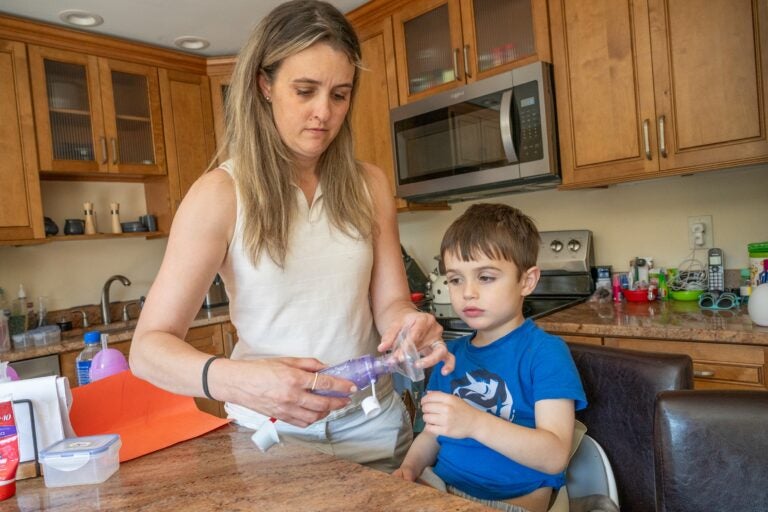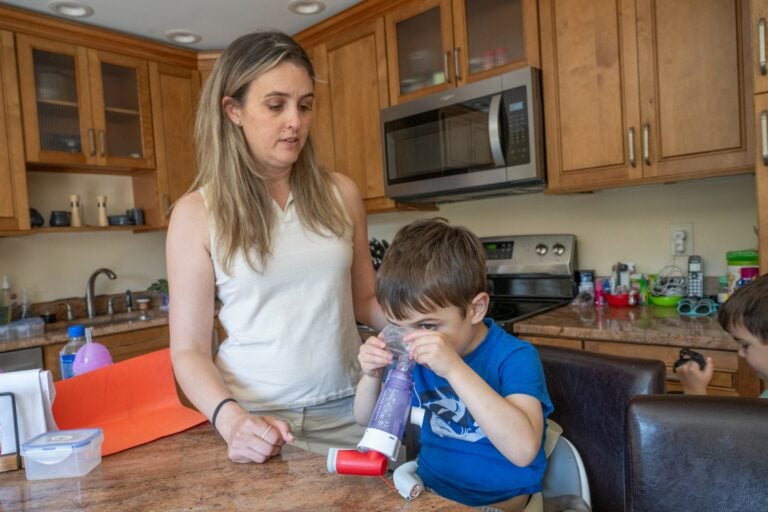Discontinued asthma medication sends Philly-area patients scrambling, in some cases to the emergency room
Some Philadelphia-area doctors say admissions to intensive care and asthma deaths among children have gone up this year, partly because of supply issues.
Listen 2:25
Media-resident Jacqueline Vakil and her 4-year-old son, James. (Jonathan Wilson for WHYY)
From Philly and the Pa. suburbs to South Jersey and Delaware, what would you like WHYY News to cover? Let us know!
When Media-resident Jacqueline Vakil needed a refill in January for Flovent, her 4-year-old son’s asthma medicine, she could not get it, because the drugmaker GSK stopped making the popular inhaler. Their insurance provider does not cover the alternative drug their doctor suggested.
All the while, her son, James, was up at night coughing. She tried Vicks VapoRub, a humidifier, and steam from a hot shower to help soothe his deep cough.
“He couldn’t sleep at night with the cough and that’s when I got to the point that I was on the phone constantly with our doctor to try and find a substitute,” she said. “He would go to school and his school would tell me that he’s having a constant cough, as well.”
Vakil was on the phone with the insurance company, the pharmacy and their doctor for hours over the course of seven weeks. The insurance company suggested medicine that did not work for her son, because those require specific breathing techniques he could not learn as a 4-year-old.
“The whole process was frustrating because I felt helpless,” she said.

After weeks, her son’s doctor, pediatrician Joannie Yeh at Nemours Children’s Health, gave her cell phone number to the pharmacy, and they found a medicine that worked for James and was covered by insurance.
“It’s really scary and very frustrating when you know our patients … may take a few days to a week to get the medication … if everything goes through smoothly,” Yeh said. “And of course parents are also working, so it’s not like they can just spend all day looking for the medication and calling around.”
She said some of her patients have had more flare-ups, or had to go to urgent care or the emergency room, because their asthma got worse without the medicine they relied on.
This is an issue that doctors at the Children’s Hospital of Philadelphia have seen as well. Philadelphia resident Shante Currie’s 9-year-old son Trey is used to being on Flovent but could not get it anymore after it was discontinued. He had an asthma attack at home in late April that left him coughing and wheezing, even with his rescue medication.
“You could see his ribs because he was struggling so, so hard to breathe,” Currie said. She said Trey was in such bad shape, she took him immediately to the Children’s Hospital of Philadelphia, where he went to the intensive care unit.
“He had to get on a breathing machine and to get an IV in him, which they were not able to do because he was struggling … they said they could not access his veins.”

Currie and Trey’s father stayed by his side during the two days that he was in the ICU. The doctors did not want to send Trey home without asthma medication, but because Flovent was no longer available, it took them two days to work out an alternative that her insurance plan would cover.
Doctors at the Children’s Hospital of Philadelphia reported in May that admissions to intensive care for children with asthma have nearly doubled compared to what it was before the pandemic, and were 50% higher than last spring. They also said at least seven children have died in the Philadelphia region this year due to uncontrolled asthma, which is significantly more than in previous years.
“When asthma deaths are totally preventable, one kid … dying is just one too many,” said pediatrician Tyra Bryant-Stephens, medical director of the community asthma prevention program at the Children’s Hospital of Philadelphia.
Pediatrician and health researcher Chén Kenyon said most likely there are other factors that led to more children being hospitalized for asthma and dying, but regardless, this should not happen because there are effective medications that can prevent asthma attacks.
“This has been a source of just friction and frustration … in terms of not being able to get families medicines that we know are effective for reducing asthma attacks,” he said.
Doctors at the Children’s Hospital of Philadelphia have since worked with the team that works on Pennsylvania’s Medicaid program to make it easier for patients to get alternative drugs. Some insurance providers have also done the same.
Kenyon and Bryant-Stephens point out that this became more of an issue because pharmacy benefit managers, which decide what medications are covered by insurance plans, decided not to cover generic asthma medications that could have worked as alternatives for patients like James. The trade association for pharmacy benefit managers, the Pharmaceutical Care Management Association, referred questions to Alex Brill, economist and founder of an economic policy consulting firm Matrix Global Advisors, which has consulted for the Pharmaceutical Care Management Association.
Brill said this all started because a new law went into effect this January that would have penalized drugmakers for big price increases in drugs for Medicaid patients, and the drugmaker GSK chose to stop making Flovent, the popular asthma inhaler, instead of risking a penalty. GSK worked with another company to make a generic version of Flovent, but that cost more. Brill said the pharmacy benefit managers did not want to pay more for the generic version of the drug, so they did not cover it in insurance plans, and patients got caught up in the negotiations.
Brill said the pharmacy benefit managers are acting on behalf of insurance providers and patients to try to bring health care costs down.
“We could as a society pay more for health care and then have access to more health care, but just as we have people who are experts … concerned about coverage of certain medicines. We also have many people in the public who are concerned about the cost of their insurance. And so we’re trying to … work in between those two objectives,” Brill said.

Get daily updates from WHYY News!
WHYY is your source for fact-based, in-depth journalism and information. As a nonprofit organization, we rely on financial support from readers like you. Please give today.









